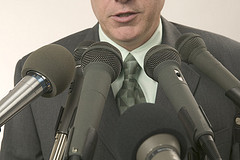We all hate public speaking. Holding a presentation in front of a crowd can be stressful even for the most experienced public speakers.  Conveying your beliefs, being seen by your audience as powerful and concise is easier said than done. Not everybody can master the art of public speaking, and you need a lot of experience and practice to persuade your audience and convince them to listen to you. If you're looking to improve your speaking habits, here are some do's and don'ts you should consider.
Conveying your beliefs, being seen by your audience as powerful and concise is easier said than done. Not everybody can master the art of public speaking, and you need a lot of experience and practice to persuade your audience and convince them to listen to you. If you're looking to improve your speaking habits, here are some do's and don'ts you should consider.
Master your P-A-L
P-A-L stands for purpose-audience-logistics, and to really master your speech you should really know your P-A-L. What is the purpose (P) of your speech? Do you want to inform the audience, persuade them to buy something or just offer them some meaningful advice? Whatever your purpose, make sure that your intensions are clearly-stated. Next, take a moment to analyze your audience (A). Are they old or young? Where do they come from? How much do they know about the subject you're preparing? Will they be able to ask you tricky questions? Answer yourself all these questions before starting a public speech.
It's nice to have perspective. Logistics (L) matters a lot in a public speech because it can help you assess the nature of your whole presentation. How long will it take you to engage the audience? Can you have a good grip on the audience in the shortest amount of time possible? As soon as you managed to determine your P-A-L, write down your objectives in really short sentences to keep your speech as organized and as structural as possible.

Preparation
You should prepare your speech only after you clarified your objectives. Collect all the material that you need and start looking for stories, analogies, involvement techniques, and case studies to back up your claims. Organize your material in a logical order and try to limit yourself to short, simple ideas during the presentation. Always remember your purpose, speak to the people by looking them in the eye, and welcome their questions. Be prepared for everything and never assume that there might be questions you can't answer.
Develop a personal speaking style
Every public speaker should have a personal speaking style. Let your values and principles come through, use words and phrases that are your own, and try not to be overly formal, even if you're speaking in a business conference. Find a way to engage the audience by making use of facts, real events, and real people. Don't fixate on articulacy and fluency, and be genuine. Others will respect and admire you for that.
Include natural qualities in your public speech by making a list with your strengths. Use your qualities and let people see the real you. Imagine that you're talking with your closest friends and use those emotions during the speech. Feel comfortable, focus on the facts, interact with the audience, and don't get too emotional. Stop thinking that people don't like you, stop analyzing very word that comes out of your mouth, and relax. Enjoy the moment!

Don'ts
Can business-savvy, intelligent people tire their audience? Absolutely! Some don't realize that public speaking is a skill that must be nurtured and improved constantly. It demands honesty, practice, and determination, and it can't be mastered in just 20 minutes. Here are some don'ts in public speaking you should avoid at all costs:
- Never start a presentation with "Thank you for being here!" because it's cliché. Wow your audience with something shocking or say something powerful to awake their interest
- Never imitate other speakers - it's best to be original in order to become memorable
- Never use someone else's stories - quotes are good to state facts, but never make other people's stories your own
- Lack of preparation - not knowing your audience may lead to boring subjects
Not everyone can master the art of public speaking. First of all, you must be an educated individual to make that happen as nobody will ever listen to someone who's inarticulate. However, grammar and accuracy are not the only traits a public speaker should have. Charisma, humor, drive, passion, and determination are equally important. Be honest and speak from the heart if you want people to relate to your stories.
